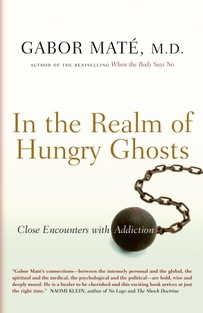
In his latest book, Dr. Mate shares with readers stories of patients he has worked with to explain the forces behind and factors leading to addiction, all the while demonstrating empathy and compassion for these individuals. Dr. Mate challenges society to think differently about this patient population, particularly to regard them without judgment and to see these individuals as human. More than that though, Dr. Mate discusses how currently society is failing when it comes to dealing with addictions, and exquisitely argues for a more progressive approach to and policy for supporting those with substance use issues.
“Not every story has a happy ending, ... but the discoveries of science, the teachings of the heart, and the revelations of the soul all assure us that no human being is ever beyond redemption. The possibility of renewal exists so long as life exists. How to support that possibility in others and in ourselves is the ultimate question” (Dr. Gabor Mate - In The Realm of Hungry Ghosts).
Recommended For:
Those interested in addictions, and any future physician or healthcare professional who is likely to encounter patients with substance use problems.
He would probably dispute it, but Gabor Maté is something of a compassion machine. Diligently treating the drug addicts of Vancouver's notorious Downtown Eastside with sympathy in his heart and legislative reform in mind can't be easy. But Maté never judges. His book is a powerful call-to-arms, both for the decriminalization of drugs and for a more sympathetic and informed view of addiction. As Maté observes, "Those whom we dismiss as 'junkies' are not creatures from a different world, only men and women mired at the extreme end of a continuum on which, here or there, all of us might well locate ourselves." In the Realm of Hungry Ghosts begins by introducing us to many of Dr. Maté's most dire patients who steal, cheat, sell sex, and otherwise harm themselves for their next hit. Maté looks to the root causes of addiction, applying a clinical and psychological view to the physical manifestation and offering some enlightening answers for why people inflict such catastrophe on themselves.
Finally, he takes aim at the hugely ineffectual, largely U.S.-led War on Drugs (and its worldwide followers), challenging the wisdom of fighting drugs instead of aiding the addicts, and showing how controversial measures such as safe injection sites are measurably more successful at reducing drug-related crime and the spread of disease than anything most major governments have going. It's not easy reading, but we ignore his arguments at our peril. When it comes to combating the drug trade and the ravages of addiction, society can use all the help it can get (Goodreads.com)
For more information and for reviews on this book, visit:
 RSS Feed
RSS Feed
